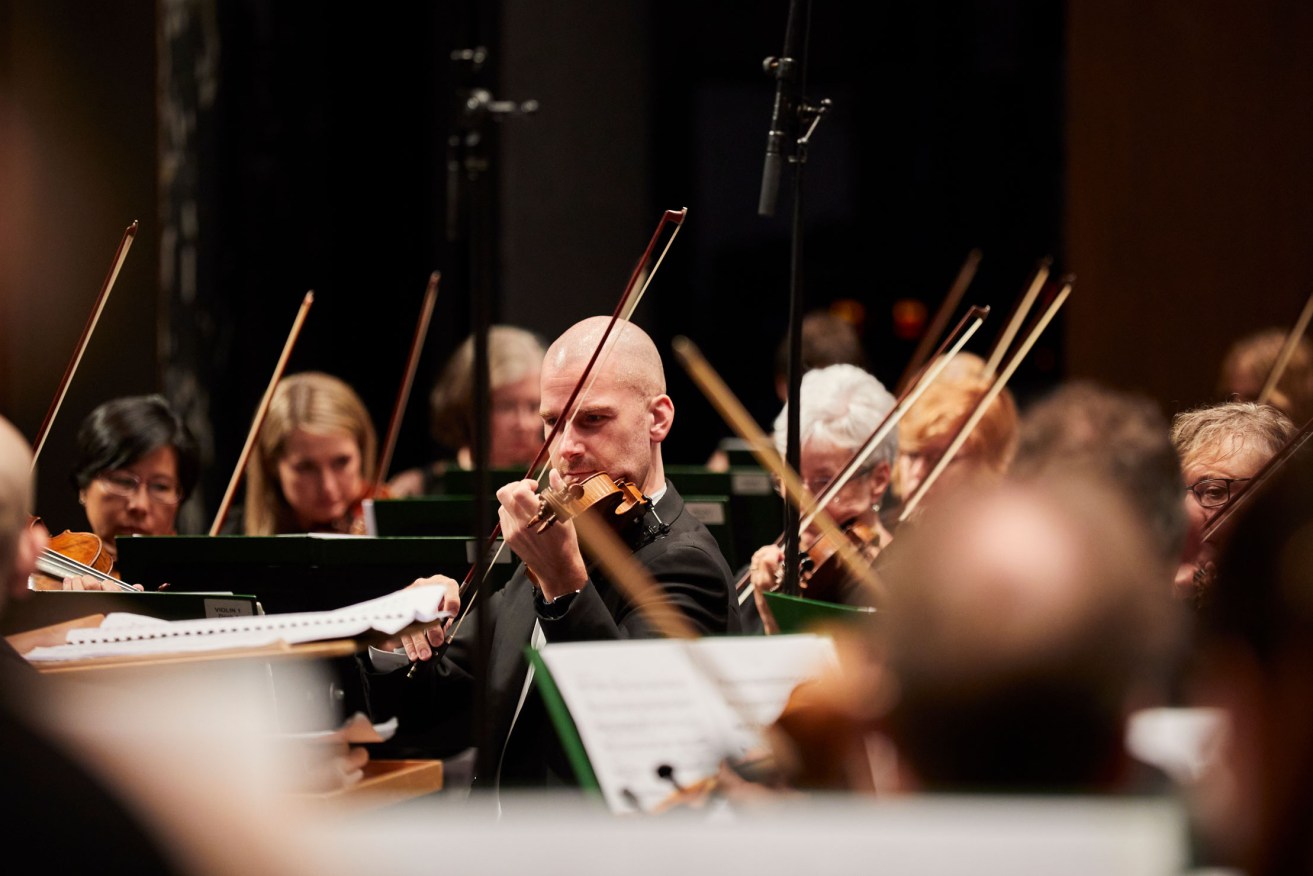Music review: Adelaide Symphony Orchestra’s Symphony Series 4
It wasn’t quite what they originally planned, but the Adelaide Symphony Orchestra weaved some magic at the Town Hall last night.


Supplied image
The finest things can come out of adversity. At the moment, when life seems to be on a hair-trigger and numerous events have been cancelled due to the pandemic, we again have to consider how lucky we are in Adelaide that some concert life actually exists at all.
It came as no surprise when Sydney based Simone Young could not cross the border to conduct the Adelaide Symphony Orchestra for its first scheduled performance in the Town Hall for 18 months. Nevertheless, last night’s concert went ahead thanks to veteran maestro Nicholas Braithwaite agreeing at late notice to step in, as he did for Grace Clifford’s July concert in the Festival Theatre.
In normal circumstances, this program could have been viewed as a bit ho-hum. Tchaikovsky’s Sixth Symphony (Pathétique) and Mozart’s Haffner Symphony shared the billing with a last-minute addition, Wagner’s Prelude to Act 1 of Lohengrin. This took the place of a new work by Mary Finsterer, which had to be shelved because the Sydney Symphony Orchestra, under lockdown right now, has first rights over its premiere.
Well, how plainly wrong did any such misgivings prove to be. This ASO concert cast an immediate and indelible spell that held one rapt from the first note to the last.
Graciously, the orchestra began with a short but snappy opener, Pudnanthi Padninthi II – Wadna (‘The Coming and the Going’), by Indigenous composer Jamie Goldsmith, a Kaurna Narungga man from the Adelaide Plains and Yorke Peninsula. Within its tiny duration of just two minutes, its pounding crescendo, building from the growling depths of the double basses, staked out the enormously wide emotional canvas of this concert.
For his ‘fairy-tale opera’ Lohengrin, Wagner dug up an old Germanic legend about valour and romance, and he begins it with shimmering sounds high up in the violins and flutes that seem to hang suspended in the air. With the gentlest but most spacious indications of pulse, Braithwaite brought out the loveliest, most magical playing from the ASO as they breathed together through each long phrase. Less is more, as they say in conducting, and Braithwaite is one of the finest exponents of that dictum – as was (the late) Jeffrey Tate, whose Wagner was glorious as well.
This concert was an emotional rollercoaster ride like few others the ASO has given.
The prospect of tackling the crisp, neat outlines of Mozart’s Symphony No.35 (Haffner) after this blissful high romanticism might have seemed perilous, but the ASO is a flexible band that can change gear quickly. With suitably reduced numbers and slimmed down expression, it adapted with keenness to muster a performance that felt both in-scale yet generous and enlivening. Again one admired Braithwaite: his minimal, disciplined gestures kept the musicians on their toes but at the same time gave them the freedom to skip, sing and exalt their way through this spirited symphony. It was a complete joy.
So to this concert’s focus, Tchaikovsky’s Pathétique. A work of turbulent, almost painful self-disclosure, it was premiered just nine days before the composer’s death from cholera in what was widely speculated at the time to have been a suicidal act – to the horror of witnesses, he chose to drink unboiled water during a cholera outbreak in Saint Petersburg. True or not, it sure is something to think about as a grim death march enters the waltzlike second movement (famously written in five-four time) and the symphony ends not on the usual high but with a gloomy, profoundly sad Adagio lamentoso.
Some conductors wave their arms around histrionically to inject requisite drama into passionate works such as this – and we’ve seen plenty doing just that with the ASO. But not so Braithwaite. Drawing the players right in his zone of focus with beguilingly small but telling movements of hand and arm, his minimalist approach again exacted correspondingly powerful results. The lush, ripe main theme of the first movement radiated pure warmth, and a furnace of passion ensued from there. The third movement whizzed along at a phenomenal rate. To pull it off so excitingly, the players need nerves of steel. Their intensity and conviction rose to great heights.
This concert was an emotional rollercoaster ride like few others the ASO has given. More than anything it spoke of a victory in the hardest situations. Music might seem an ornament to human life, such as in times like these, but when it is shared in glorious performances as on this occasion, it actually proves to be a vital necessity.
Bravo to the ASO and especially to Nick Braithwaite. Here’s a suggestion: why not name him the orchestra’s conductor laureate on the strength of his long and distinguished contribution spanning back to when he was its principal conductor from 1984 to 1991?
There are further performances of this concert at the Town Hall on Friday and Saturday nights.




